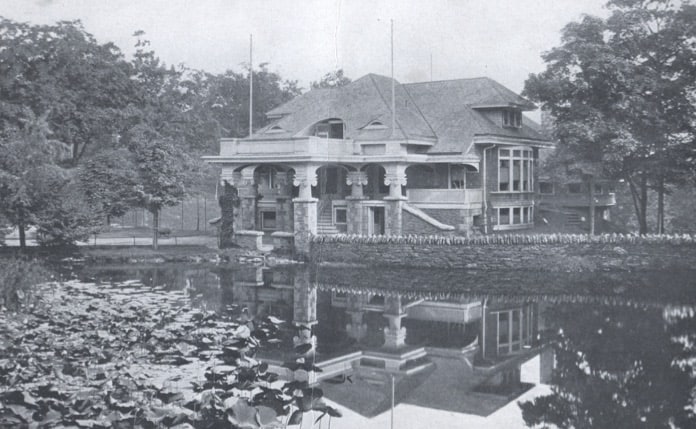
By Mary Hoar, President Emerita, Yonkers Historical Society, recipient of the 2004 Key to History, Member of the Yonkers Landmarks Preservation Board
Monday, March 1st
March 1, 1935: NYS Senator James Garrity introduced a bill in the State Legislature to pay Yonkers City Court Jurors three dollars a day; at the time they were paid twenty cents a day.
March 1, 1944: After reading The Saturday Evening Post, Yonkers learned Charles Towner, US Coast Guard Sound Man Third Class, was a member of the USS North Star crew that mounted an expedition against the Nazi radio station and weather base in Greenland a few months earlier. Towner, son of former Third War Alderman Harry Towner of Warburton Avenue, wrote his parents he was surprised to meet Alan Codd of Park Avenue while in Greenland; Towner and Codd attended Yonkers High School together.
March 1, 1962: The Park Hill Racquet Club burned down; this formerly had been known as the Park Hill Country Club.
Tuesday, March 2nd
March 2, 1928: James Lessner of South Broadway was awarded $50,000 for injuries suffered while repairing an elevator in New York City. The case, heard by Supreme Court Justice Joseph Morschauser, ended quickly when the jury returned a verdict for the plaintiff after deliberation of less than 15 minutes. Lessner was repairing an elevator when the janitor touched the control switch, causing the elevator to crash to the ground floor. As a result, Lessner suffered paralyzing injuries to his arm.
March 1, 1936: Sixteen-year-old Yonkers Eagle Scout Charlie Pound appeared on Major Bowes Amateur Hour. Before he began playing the accordion, Charlie told the Major he was known as the “Boy with the Flying Fingers,” adding that he was “the fastest accordion player in the world.”
Wednesday, March 3rd
March 3, 1923: Well known local singer Janet Beck of Guion Street, broadcasting from a major NYC studio, was the first American female vocalist to be heard overseas.
March 3, 1947: The Family Service Society of Yonkers filed plans with the Building Department to alter its new headquarters at 219 Palisade Avenue. Formerly the home of Charles Ketcham, President of the Yonkers Savings Bank, Family Service decided to purchase the Palisade Avenue building after a sharp rent increase by the new owners of 45 South Broadway. Previously owned by the Westchester Lighting Company, the Society only was charged a “courtesy rent” of $1,000 per year. Currently located at 30 South Broadway, the organization first opened in 1883 in the Woman’s Institute, moved to the Proctor Building in 1919 and then to their Palisades Avenue home in 1943.
Thursday, March 4th
March 4, 1927: “Millionaire straphanger” John E. Andrus returned home to Yonkers after a three-week vacation in Fort Myers, Florida. According to Andrus, he “stayed in Florida as long as his money lasted.”
March 4, 1932: After an anonymous note was found in an east Yonkers mailbox, police searched Grant Avenue and Lincoln Park for the kidnapped Charles A. Lindbergh Jr.
March 4, 1936: People in downtown Yonkers were talking about a small brass plate sunk into the sidewalk at the southwest corner of South Broadway and Hudson Street; the inscription read, “Property Line Cochran Estates, Inc. Crossing by Permission Only. Permission Revocable At Will.” No doubt, thousands of people had unwittingly “trespassed” on this property.
Friday, March 5th
March 5, 1834: Frederick Weed bought what now is the Sherwood House Museum for $1200; his family occupied this home for 89 years. The Yonkers Historical Society now runs the museum.
March 5, 1930: A labor dispute that became a boycott was settled when a bakery was sold. The dispute at the Rosenmann Bakery on Riverdale Avenue began when Rosenmann hired men affiliated with independent local union #164. His other workers, members of AFL Bakery and Confectionery Workers Union #144, were unhappy he brought “members of a socialistic union” to work in Yonkers. The new owner, Mr. A. Brock, signed an agreement to operate the shop only using members of Local #144.
March 5, 1932: Bert Corbalis, Chairman of the Joint Veterans’ Committee announced it would try to use the old Statesman Building at 86 Main Street for relief distribution headquarters. The committee was notified it, along with the Salvation Army, would have to vacate its present quarters at Hudson Street and Riverdale Avenue immediately as it had been rented to an automobile dealer.
Saturday, March 6th
March 6, 1911: Alderman Hayes proposed a high fence be built around the Fortfield Reservoir to prevent suicides.
March 6, 1942: New York Daily News columnist Ed Sullivan mentioned Yonkers native Brigadier General Frank Brady in his column; hero aviator Brady, the son of late Yonkers Police Captain Hugh Brady, had won new awards for his courage fighting in the skies over Java.
March 6, 1950: Yonkers baseball star Steve Ridzik broke his knee while working out at the Philadelphia Phillies’ Training Camp in Clearwater, Florida.
Sunday, March 7th
March 7, 1911: Stephen Thayer, Chairman of the Manor Hall Committee, announced Alexander Smith Cochran had offered to finance restoration of the Manor Hall to its pre-Revolutionary splendor.
March 7, 1928: After Public Safety Commissioner Frank Devlin asked for an opinion, Corporation Counsel Leonard McAneny ruled that an appearance of Roscoe “Fatty” Arbuckle at Loew’s Theater, would not constitute “an offense against public decency,” and the city had no legal right to block his appearance.
March 7, 1947: Harold Zulauf, VP of Industrial Relations for the Smith Carpet Company, spoke to students at Cornell University’s School of Industrial Labor Relations in Ithaca, the first four year-course of its kind in the country. After speaking to students in open forums on “Bridging the Gap between Management and Labor,” he had dinner with students at the student union.
For more information on the Yonkers Historical Society, Sherwood House and our upcoming events, please visit our website www.yonkershistoricalsociety.org, call 914-961-8940 or email yhsociety@aol.com.





